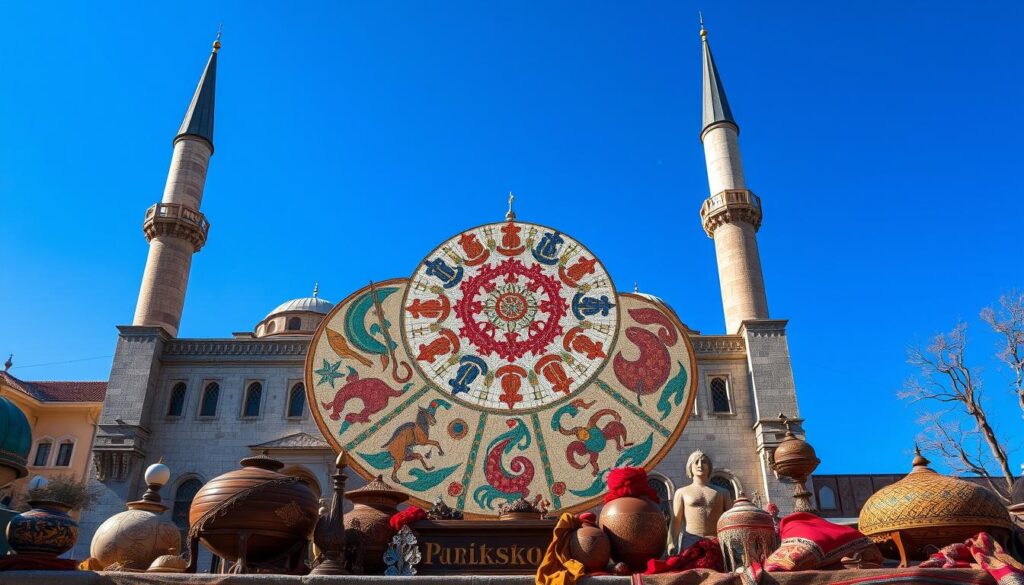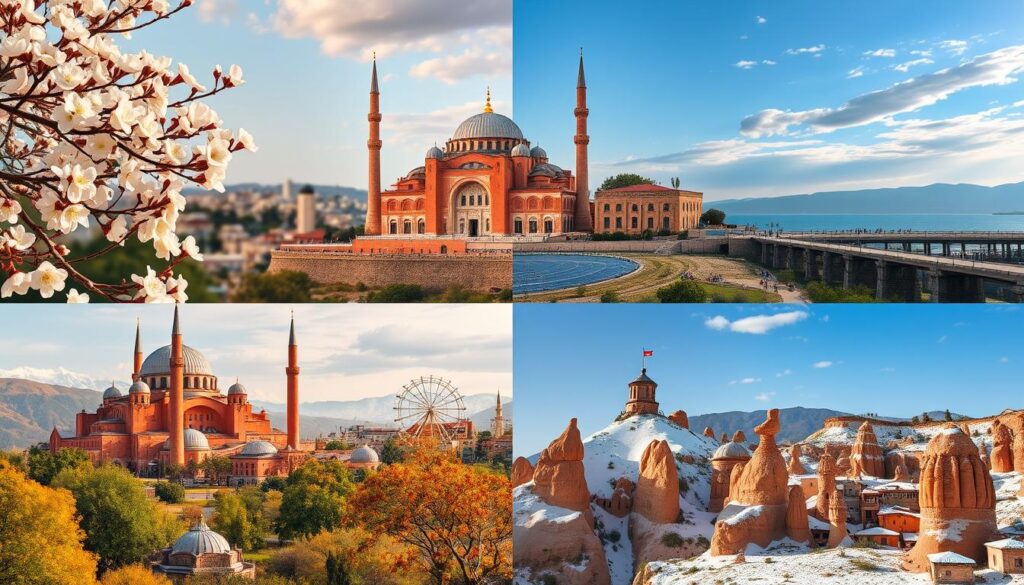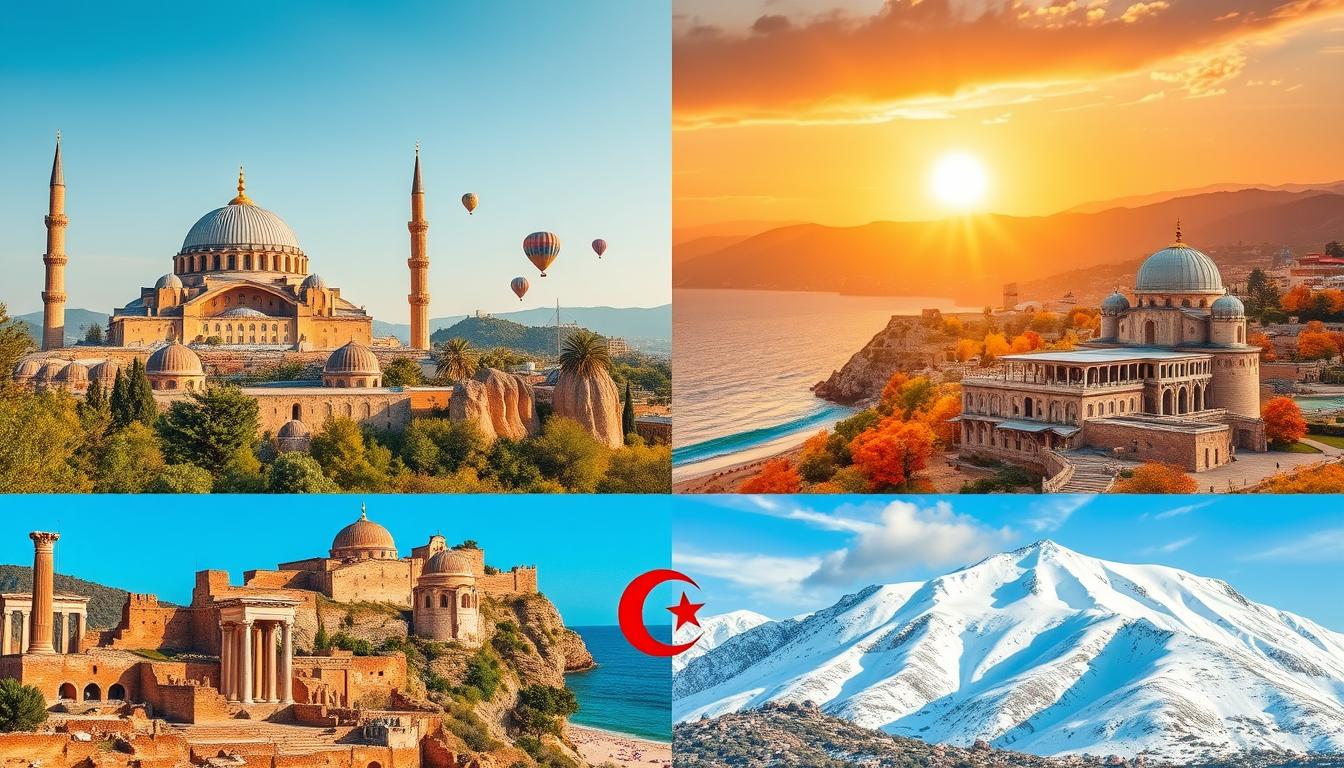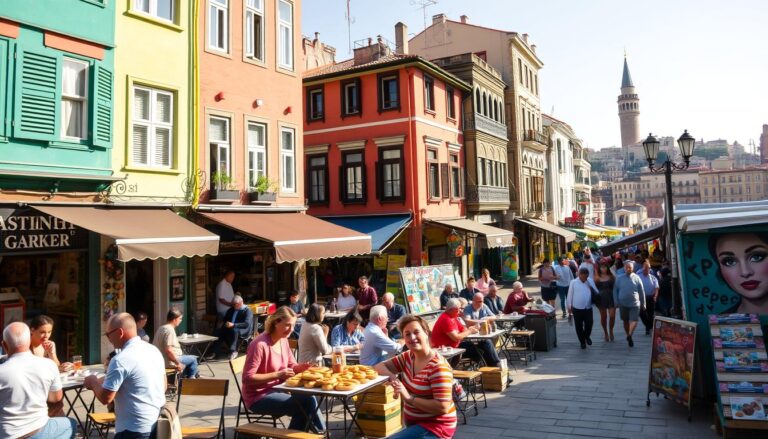Best Time to Visit Turkey: the Crossroads of Civilizations
As your plane lands in Turkey, excitement fills the air. This country, where East meets West, invites you to explore its history, landscapes, and culture. From Istanbul’s lively bazaars to Ephesus’ ancient ruins, Turkey promises unforgettable experiences.
Table of Contents
Understanding Turkey’s Cultural Significance
Turkey’s culture is rich and diverse, thanks to its Ottoman and Byzantine heritage. It sits between Europe and Asia, making it a key spot for many cultures. This mix of traditions is seen in its stunning architecture, delicious food, and lively festivals.
Ottoman and Byzantine Legacy
The Ottoman and Byzantine past is all over Turkey’s culture. The Hagia Sophia, once a Byzantine cathedral, now shows Turkey’s religious and architectural variety. The Blue Mosque in Istanbul also shows this mix, blending Islamic and Byzantine styles.
The Meeting Point of East and West
Turkey’s location at the crossroads of Europe and Asia has shaped its culture. It has been a bridge between the East and West, sharing ideas, art, and traditions. Turkish food is a great example of this mix, blending Mediterranean, Middle Eastern, and Central Asian flavors.
Historical Influences on Modern Turkey
The Ottoman and Byzantine empires’ legacy still affects Turkey today. Islamic practices, family traditions, and architectural wonders are all part of Turkey’s culture. Visitors get to see a blend of old and new, making their experience unforgettable.
| Key Cultural Aspects | Description |
|---|---|
| Religion and Religious Practices | The majority of Turks are Muslim, celebrating important Islamic holidays. Ramadan, Eid al-Fitr, and Eid al-Adha show the Islamic influence in Turkey. |
| Cuisine and Culinary Traditions | Turkish food is known for its rich flavors and social dining. Kebabs, mezes, baklava, and Turkish coffee are key parts of Turkish culture. |
| Festivals and Celebrations | Turkey’s festivals and celebrations reflect its history and religion. Events like Republic Day, Ramadan, and regional festivals show Turkey’s cultural heritage. |
Exploring Turkey, you’ll find a rich tapestry of turkey cultural heritage, ottoman influence, and byzantine legacy. From its grand buildings to its vibrant culture, Turkey shows the power of cross-cultural exchange.

Best Time to Visit Turkey: Seasonal Guide
Discovering the best months for your Turkey trip means exploring the country’s varied climate and culture. Turkey offers something for everyone, from spring’s flowers to summer’s beaches and winter’s snow. Each season has its own charm, perfect for different travelers.
Discover Turkey’s Enchanting Seasons
- Spring (April to May) – Enjoy mild weather, cultural events, fewer crowds, and lower prices. Spring is ideal for exploring Turkey’s heritage.
- Summer (June to August) – The coast comes alive with beaches, nightlife, and outdoor activities. It’s perfect for those who love the sun and sea.
- Fall (September to October) – The shoulder season offers good weather and lower prices. It’s great for those who love culture and outdoor adventures.
- Winter (November to March) – Find deals in the low season, but be prepared for cold temperatures, especially in Cappadocia.
Turkey’s diverse landscapes, rich history, and lively culture attract visitors worldwide. Knowing what each season offers helps plan the perfect trip. Whether you’re interested in the turkey weather guide or the ideal months for turkey trip, Turkey has something for everyone.

“Turkey is a mosaic of cultures, where the East and West collide in a symphony of ancient and modern wonders.” – John Doe, Travel Enthusiast
So, whether you’re interested in the turkey climate by month or the country’s heritage, Turkey’s seasons promise memorable experiences all year.
Spring in Turkey: A Blooming Paradise
As winter fades, Turkey bursts into life with spring. From April to May, the country is filled with mild weather, lively festivals, and outdoor fun. Spring in Turkey is perfect for those who love culture, nature, or avoiding the crowds.
April and May Weather Conditions
Spring in Turkey means comfortable days, from 16°C to 26°C. Coastal areas like Antalya and Izmir are warm, while places like Ankara and Cappadocia are a bit cooler. Istanbul might see some rain, but the weather is mostly mild and pleasant.
Spring Festivals and Events
- The International Istanbul Film Festival in April showcases global cinema.
- The International Istanbul Tulip Festival in April turns the city’s parks into a colorful tulip wonderland.
- National Sovereignty and Children’s Day on April 23rd is a big national holiday with parades and performances.
- The Istanbul Jazz Festival in April features famous musicians for a music celebration.
Popular Spring Activities
- Visit ancient sites like Ephesus and Safranbolu, enjoying the weather and fewer crowds.
- Take a hot air balloon ride over Cappadocia’s stunning views at sunrise.
- Explore Pamukkale’s thermal waters and travertine terraces.
- Join in the cultural festivities and outdoor markets across Turkey.
Spring in Turkey is a great time to see the country’s beauty and culture. With its blooming landscapes, festivals, and good weather, it’s perfect for travelers. Whether you’re looking for a budget trip or a unique experience, spring in Turkey is a true paradise.
Summer Travel in Turkish Coastal Regions
The sun shines brightly over Turkey, making the coastal regions a top spot for summer getaways. From June to August, the turkey summer vacation season is perfect, with temperatures from 11°C to 27°C. The turkish riviera along coastal turkey offers a refreshing break from the heat with its sea breezes.
Summer is lively, especially with the Aspendos International Opera and Ballet Festival in June and July. This event draws people from everywhere, offering a mix of classical music, ballet, and culture.
While cities get hot, the coast is ideal for beach trips, water sports, and cruises. Places like Izmir, Bodrum, and Kusadasi mix stunning views, history, and a lively coastal vibe.
“Turkey’s south coast resorts are most popular in the summer months from June to September, with peak crowds and prices in July and August.”
The turkish riviera in the turkey summer vacation season is unforgettable. Enjoy the warm welcome, explore cultural spots, and make memories along coastal turkey.
Exploring Istanbul’s Magnificent Attractions
Istanbul is a city that connects Europe and Asia. It has many iconic attractions. You can see the Hagia Sophia and the Blue Mosque, among others.
Hagia Sophia and Blue Mosque
Hagia Sophia was built in 537 AD. It was a museum until 2020 and is now a mosque. Its Byzantine architecture and mosaics are stunning.
The Blue Mosque, built in 1616, is famous for its blue tiles. It’s free to visit for everyone.
Grand Bazaar Experience
The Grand Bazaar is a huge covered market. It’s full of colors and sounds. You can find Turkish carpets, ceramics, and spices here.
Bosphorus Cruise Options
A Bosphorus Strait cruise is a must in Istanbul. You’ll see the city’s skyline from the water. The ferry from Eminonu to Kadikoy is a cheap and scenic ride.
Istanbul is a city with a rich history and modern vibe. It has the Hagia Sophia, Blue Mosque, Grand Bazaar, and Bosphorus Strait. These places will make your trip unforgettable.
Cappadocia: Timing Your Visit for Perfect Experiences
Cappadocia, in central Turkey, is famous for its dreamlike landscapes. It has “fairy chimneys” and underground cities. Visiting at the right time is key to enjoying everything it offers. Whether you want to see hot air balloons, explore caves, or dive into local culture, Cappadocia is perfect all year round.
Discover the Best Time to Visit Cappadocia
The best times to visit are spring and fall. Spring (March to May) has mild weather and beautiful flowers. It also hosts the Cappadox cultural festival. Autumn (September to November) is great for comfortable weather and fewer people, with festivals like the Ürgüp International Grape Harvest Festival.
For a hot air balloon ride, spring and fall mornings are best. The winds are calm, and the skies are clear. Summer (June to August) is hot and busy, but it’s when the balloon festivals happen.
Winter (December to February) is quieter and cheaper. The snow and Mount Erciyes ski resort offer unique winter fun.
| Season | Temperatures | Rainfall | Crowds | Highlights |
|---|---|---|---|---|
| Spring (March-May) | 15-23°C (59-73°F) | 2-5 days of rain | Medium | Cappadox Festival, mild weather, blooming landscapes |
| Summer (June-August) | 23-29°C (73-84°F) | 1-2 days of rain | High | Hot air balloon festivals, peak tourism season |
| Fall (September-November) | 15-16°C (59-61°F) | 2-5 days of rain | Medium | Grape Harvest Festival, Cappadocia Ultra Marathon, comfortable weather |
| Winter (December-February) | 0-8°C (32-46°F) | 5 days of rain | Low | Skiing at Mount Erciyes, lower prices, fewer crowds |
Visiting Cappadocia at any time is special. Its landscapes, history, and unique experiences make for an unforgettable trip. Plan well to enjoy every moment in this magical Turkish place.
Fall Adventures in Turkey’s Heartland
As summer fades, Turkey’s heartland welcomes you with open arms. From September to October, the central regions offer perfect weather and fewer people. It’s the best time to see the culture and nature.
September and October Activities
The weather is just right, from 6°C to 21°C, perfect for outdoor fun. Hike the Lycian Way, a scenic trail with ancient ruins and villages. Or, try mountain biking in Cappadocia to see fairy chimneys and caves.
Hiking and Outdoor Exploration
Fall is great for visiting Turkey’s ancient sites like Troy and Pergamon. The weather is cool, and there are fewer people. You can enjoy history and archaeology without the summer heat.
Cultural Festivals in Autumn
As leaves change, Turkey’s heartland buzzes with festivals. Don’t miss the International Wine Festival in October. It’s a chance to taste Turkish wines and learn about winemaking.
Fall in Turkey’s heartland is perfect for adventure, culture, or both. With mild weather, fewer crowds, and many festivals, it’s a great time to visit. It’s truly one of the best times to visit Turkey.
“Turkey’s heartland in the fall is a true feast for the senses, where the crisp air, vibrant landscapes, and lively cultural celebrations come together to create an unparalleled travel experience.”
Winter Tourism and Ski Opportunities
When it gets cold and snow falls, Turkey turns into a magical place. It’s a special time for travelers from November to March. The country’s varied landscapes and cultural spots invite those looking for a break from the chill.
Turkey is a top spot for skiing, with places like Erzurum and Kartepe leading the way. These areas have the right weather for skiing, with temperatures between -3°C and 7°C. The eastern highlands, over 1,500 meters up, start getting snow in November. This makes for a beautiful winter trip.
But Turkey isn’t just for thrill-seekers. Cities like Istanbul are peaceful in winter. With fewer people around, you can see sights like the Hagia Sophia and Blue Mosque easily. It’s also a great time to enjoy cultural events, like the Whirling Dervish Festival in Konya.
Turkey’s natural beauty is also on display in winter. Places like Pamukkale’s thermal waters are especially inviting when it’s cold. Plus, traveling here in winter can save you money, making it a great choice for those on a budget.
Turkey has something for everyone in winter. Whether you want to ski, dive into culture, or just relax, there’s a place for you. From snowy mountains to lively cities, Turkey offers a unique and memorable winter experience.
Travel Planning Tips and Essential Information
When planning your trip to Turkey, consider getting an e-visa in advance. The Turkish government’s e-visa website makes it easy to apply. Also, use trusted travel companies, especially in Cappadocia, where planning can be tricky.
Istanbul has two big airports: Istanbul International Airport (IST) and Sabiha Gokcen Airport (SAW). For Cappadocia, Nevşehir Kapadokya Airport or Erkilet International Airport are best. Don’t forget to buy a Turkey eSIM for easy internet access.
When visiting coastal resorts in early spring or late fall, check their opening dates. This way, you can plan better and have a great time in Turkey.







